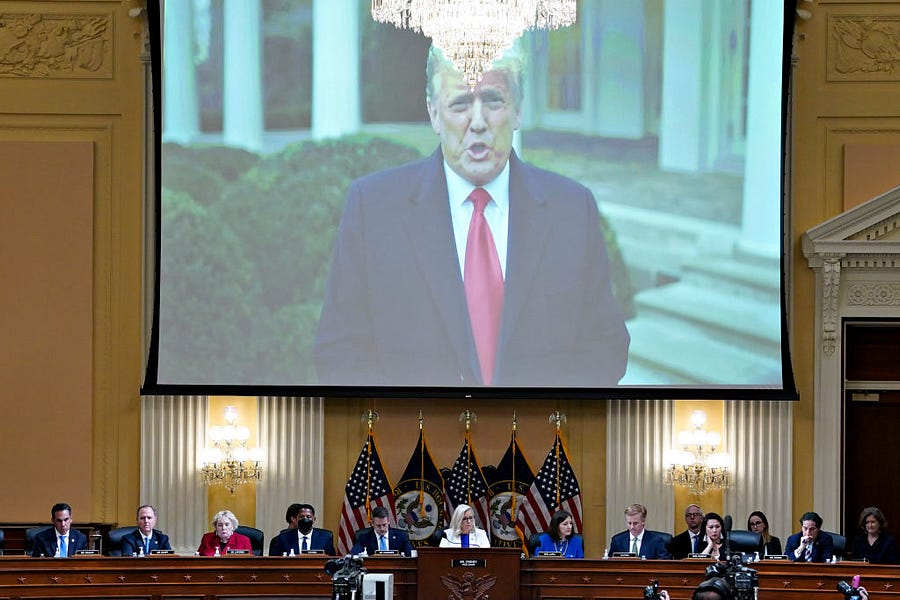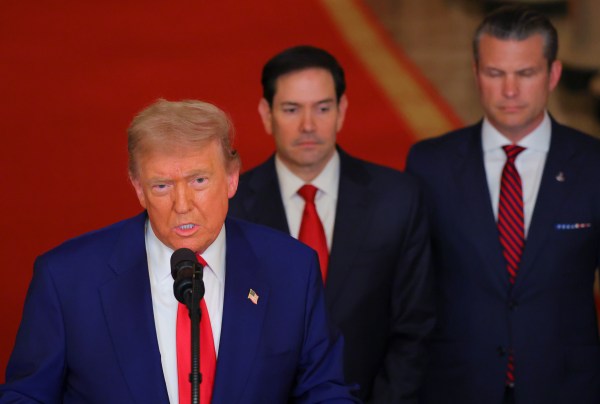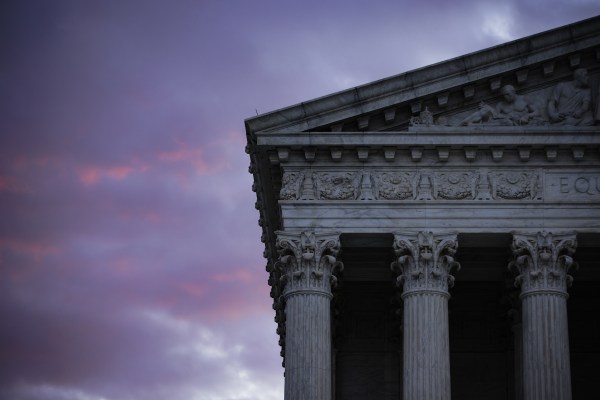I want to start with this newsletter with a few brief excerpts of speeches by important and powerful American Christians. Here’s the first, from Senator Ted Cruz, telling a conference of conservative youth his approach to preferred pronouns:
Then here’s Senator Josh Hawley, the man who fist-pumped the January 6 mob, only to run away when they breached the Capitol:
Finally, here’s Representative Matt Gaetz yesterday at the same Turning Point conference where Cruz and Hawley spoke:
He doesn’t talk about it much these days, but Gaetz too has cast himself as a Christian politician in the past: “I was saved in a Baptist Church during my teenage years. I am a member of First Baptist Church in Fort Walton Beach. The Bible, the Gospel—these are our instructions from God. We are to follow faithfully.”
It should also be noted that Gaetz has been investigated for sex crimes, including whether he paid for sex and had sex with a 17 year-old girl.
Donald Trump isn’t in a single one of these videos. He’s not mentioned in any of the excerpts. Yet they present a compelling reason why Trump deserves not one single Christian vote if and when he chooses to run for president again—when it comes to American politics, Trump has discipled the church far more than the church has discipled Trump.
One of the most amusing recurring conversations of the last six years is the omnipresent effort to explain to me “why Christians support Donald Trump”—as if I need tweet threads or pointed essays to explain to me my own friends, many members of my family, and my own church and neighborhood. I understood perfectly well then. I understand perfectly well now.
But there is a key difference between then and now. Now we’ve seen who he is, we know his impact on our nation, and we’ve seen his influence on the church. This isn’t the 2016 primary, it’s not the 2016 or 2020 general elections. There is no more “binary choice,” and what was once a hypothetical presidency was all too real.
From the beginning of the Trump era, there was only one pro-Trump argument that gave me pause, and it wasn’t the rationalization that “he fights.” The idea that the Democratic alternatives were so bad or the white working class so disrespected that the Trumpian “middle finger” to the establishment was justified or wise was never morally serious.
If the early church was admonished to love its enemies, bless those who persecute them, and exhibit the fruit of the spirit even when they’re being persecuted and massacred, it’s just hard for me to believe the threat of Hillary Clinton or Joe Biden was so great that it justified the lies and cruelty inherent in Trumpian political engagement.
But here’s an argument that was morally serious, especially in both general elections—if one candidate is going to win, shouldn’t you vote for the one you believe in good faith will do the least harm to the nation, even if that person has profound flaws?
This was the “lesser evil” or “hold your nose and vote” position. There are people I respect who made this choice both times, and they did so without once rationalizing Donald Trump’s lies or minimizing his sins.
They were, unfortunately, not the norm, and the reason why provides an explanation not just for the actions of Ted Cruz, Josh Hawley, and Matt Gaetz, but also for the actions of countless angry Christians in the age of Trump, including to people you know—fathers, mothers, uncles, and aunts.
To understand why, we have to understand human nature.
As I wrote years ago in National Review, precious few people want to be part of a movement that’s merely “less evil.” They don’t want to be or do anything evil at all. They want to be proud of their president. They want to be proud of their movement. And while it might be easy to reconcile a one-time action (like a vote) as less evil, it becomes far more difficult when your political affiliation is part of your identity.
Many millions of Republicans aren’t just Republicans on Election Day, they’re Republicans every day. And Donald Trump placed every-day Republicans in a constant dilemma. Did you point it out when he did evil things? Or did you mainly remain silent, trusting in the notion that no matter how bad Trump was, his opponents were worse?
Or, even worse, did the tension between Trump’s actions and your own morality grow so great that you started to redefine morality itself? How many people made the migration from supporting Trump in spite of his character to supporting him because of who he was? I can think of countless folks, in both public and private life.
That’s what discipling looks like.
Ted Cruz says his pronouns are “kiss my ass’ not just because he corrupted himself for Trump but because the crowd is corrupt as well. The same analysis goes for Josh Hawley’s refusal to apologize for his fist salute or his election challenge. He is morally corrupt. That cheering crowd is morally corrupt.
Why? Because they’ve absorbed the lessons Trump taught. Fight the left with profane anger. Never apologize.
I’m haunted by a story from January 6. A friend of mine, a staunch Republican, wrote a Facebook post unequivocally condemning the violence at the Capitol. He didn’t mention Trump. He didn’t condemn Trump. Yet the reaction from friends, neighbors, and his own family was furious.
My friend had to back away from politics to preserve his most precious relationships, including his relationship with his own father. I know both men. I know many of the people who responded to my friend online. And those people who responded with such rage and fury—who’d drunk so deeply of the conspiracy Kool-Aid—were not always like that. They’d be unrecognizable to their 2015 selves.
They’d been discipled by Trump.
So why write about Trump and Christianity again? Three reasons. First, he’s the undeniable front-runner for the 2024 GOP nomination, and there are reports he might even announce his candidacy before the 2022 midterms.
Second, the January 6 Committee is doing an extraordinary job using the words of Trump’s own officials to fully expose to anyone who has eyes to see and ears to hear that Trump corruptly and likely criminally engineered an American coup.
Third, Axios reported this week on potential Trump plans for a second term, including a radical civil service reform that could lead to the government being stocked not with thousands of Trumpist officials, but with tens of thousands—discipled by Trump, imitating Trump, devoted to Trump.
Can we count on such a government to respond to the rule of law? Of course not. We should expect Trump to fill the government with his most loyal servants, and the January 6 hearings have taught us that loyalty to Trump sometimes requires lawlessness.
In 1998, the Southern Baptist Convention passed one of the most prescient and important resolutions in the denomination’s history. Its Resolution on Moral Character of Public Officials is full of wisdom, but no line is more important than this: “Tolerance of serious wrong by leaders sears the conscience of the culture, spawns unrestrained immorality and lawlessness in the society, and surely results in God’s judgment.”
It sears the conscience of the culture in part by placing the conscience in tension with the tribe. Over the weeks, the months, and the years, when the price of calling out actual evil—even an alleged lesser evil—is ostracization and alienation, then it’s often only a matter of time before your mind turns “lesser evil” into “not evil at all.”
So here we are in 2022 when American Christian political leaders behave in public more like Trump than like Christ. American Christian families are torn apart by MAGA members who behave—the instant the topic turns to politics—more like Trump than like Christ.
There was never any justification for this dark turn. And now there’s not even any thoughtful argument left for the “lesser evil.” There is no binary choice. Republican Christians can say to Trump, right now, that there is no case for him over other Republicans—men or women who can choose better judges than Democrats, pursue better policies than Democrats, and defeat Joe Biden without resorting to lies and conspiracy theories and without corrupting the conscience of the church.
One more thing …
This week I had a great conversation with my friend Paul Miller about his fantastic new book, The Religion of American Greatness: What’s Wrong With Christian Nationalism. It included an excerpt that made quite a few people very, very mad with me—about religious instruction in public schools.
Watch and let me know. Am I wrong?
One last thing …
I linked this song in a newsletter many, many months ago, but I’ve been listening to it again. It’s beautiful. Enjoy:







Please note that we at The Dispatch hold ourselves, our work, and our commenters to a higher standard than other places on the internet. We welcome comments that foster genuine debate or discussion—including comments critical of us or our work—but responses that include ad hominem attacks on fellow Dispatch members or are intended to stoke fear and anger may be moderated.
With your membership, you only have the ability to comment on The Morning Dispatch articles. Consider upgrading to join the conversation everywhere.